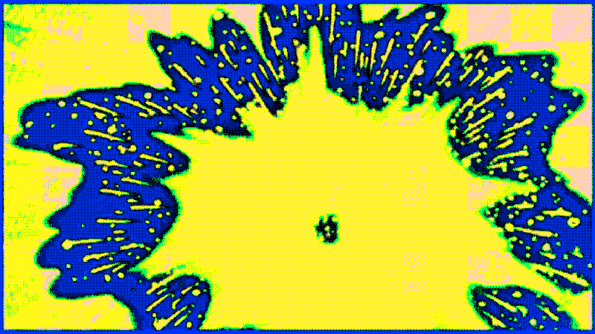Search
To search for an exact match, type the word or phrase you want in quotation marks.
A*DESK has been offering since 2002 contents about criticism and contemporary art. A*DESK has become consolidated thanks to all those who have believed in the project, all those who have followed us, debating, participating and collaborating. Many people have collaborated with A*DESK, and continue to do so. Their efforts, knowledge and belief in the project are what make it grow internationally. At A*DESK we have also generated work for over one hundred professionals in culture, from small collaborations with reviews and classes, to more prolonged and intense collaborations.
At A*DESK we believe in the need for free and universal access to culture and knowledge. We want to carry on being independent, remaining open to more ideas and opinions. If you believe in A*DESK, we need your backing to be able to continue. You can now participate in the project by supporting it. You can choose how much you want to contribute to the project.
You can decide how much you want to bring to the project.

Francesc Ruiz –In some of your fanzines, science fiction is used as a way of approaching contemporary international conflicts in a delirious way in order to broaden the framework for discussion beyond the narcotic effects of the media.
When you shared some of your work with me, you mentioned Introduction to Science Fiction by the Cuban writer Óscar Hurtado, and this made me think about the development of the genre under different ideologies. I would like you to share with us how you explore the links between science fiction and ideology in your production.
Irkus M. Zeberio – In its philosophical, though not in its propagandistic voice, ideology interests me for its creative function, creative in the artistic sense, that is, not creating from nothing but rather giving order to chaos. From this point of view, philosophies have attempted to define what is human, and in successive historical moments they have mutated the subject to conform to these changes. After the industrial revolutions and the introduction of the machine on a universal scale, this drive to define what is human was tremendously determined by the existence of machines. Both Soviet and American science fiction owe their dominant positions in mass culture to their own industrial revolutions. Today, more than a hundred years later, this relationship between the human and the machine is even more intense, and that is why the arts, philosophy, etc, from the mainstream to the marginal, and to a greater or lesser extent, are related to science fiction. Science fiction is something like literature that revolves around the notion of the human in relation to machinery. And that is why I am there, too.
In his Introduction to Science Fiction, Óscar Hurtado draws a brief genealogy of this literature. Augustinian Christianity steeped in literature gave birth to Tomas More’s Utopia, and to the industrial revolution and the techno-optimism of factories that shaped science fiction as a genre. The book also makes a magnificent analysis of the bases of fiction whose essence, the Aristotelian phantasmata, gave its name to the magazine that we wanted to publish with Ignacio García Sánchez.
I discovered Óscar Hurtado through the extraordinary Cuban fanzine KORAD, as well as through blogs that discuss the fanzine. The best thing is that you download it and read it. KORAD is a lot of fun and it has afforded me many hours of entertainment. It is of uneven quality —like the best things in life, the real ones— since it is a collective fanzine and accommodates people who are just starting out or who have a job that prevents them from fully devoting themselves to writing. The reason it attracts me so much, and it’s important that people understand this bizarre adoration of mine, is due to the place it occupies in the world. It has given me a more accurate vision of who we are, which is difficult to understand overwhelmed as we are by millions of lame, middle-class role models. With KORAD, I shifted my gaze towards the “Third World”, something which I think everyone on the Left should do.
The reference you make to my delirious approach to current affairs in my zines is more than just a position, still under construction, or a point of view, rather than just a style or mannerism. Contrary to what people say, compared to other artistic traditions, it is a true mirror that reflects deformed mirrors. Inevitably, the aesthetic that emerges from it will be perceived as delusional and monstrous. We are in a time of change and, as I read on Twitter, one shouldn’t be afraid to cause others to cringe.
FR – You present for the first time in A-Desk a small constellation of gifs, in which you mention Musorgsky’s symphonic poem A Night on Bald Mountain, inspired by Gogol’s story about an akelarre near Kiev, and the Disney adaptation of Goethe’s poem The Sorcerer’s Apprentice played by Mickey Mouse, as well. I think I see in your work references to the current Russian-Ukrainian conflict. Can you tell us a little about this new work.
IMZ – Well, this work, of which I include here some crude ideas, occurred to me after a kind of psychosocial dislocation, a direct consequence of the war and its daily mindfucks. Propaganda today is multiplied and amplified right into our mind and with such intimate depths —almost a physiological, tele-bodily relationship, like online porn— that it completely annuls us. With constant nuclear threats, scarcity, hunger and death, we are obliged to generate ideas that go beyond the current state of things, for history does not stop.
One day, while watching the Disney animated film Fantasia with my nephews, I began to relate the semantic elements of the film to current events. Later, with a more in-depth analysis, I was able to glimpse through reverse magic the meaning of those ancient images so often repeated throughout the history of art, such as the metaphor of the hat as mind, the stars as ideas or the magician as a creator.
In my project, Mickey is an infantilized human who wears a hat full of stars loaded with references to the world of ideas, such as the flag of the European Union or the Catholic iconography of the star-like halo on the heads of virgins and saints.
In the movie, Mickey dances and with a wave of his hand he starts spreading shooting stars; or might it not be white phosphorus which in his delirium he doesn’t see? This seems to me to be a good analogy for this new era of trenches and propaganda-war in the Donbass.
FR – Maquina Total, the print shop you run with Pablo Taladro and Naida Mazzenga, along with the Fatbottom bookstore specializing in comics and fanzine in the back room, is one of the main self-publishing sites in the country. After several years of existence, what do you think about the project? How has it affected your personal practice and, on an almost political level, with your militancy in self-publishing, how do you see it after all this time?
IMZ – We don’t direct anyone here, the anarchy of production reigns in this shop. In relation to our graphic production, our printing press gives us the opportunity to reproduce work at cost, which is important, and on top of that we have Fatbottom who is our distributor and helps us out.
It’s important to us to win our right to exist through our work. The strategy of building a printshop was proven to me at a young age by the examples of Oteiza, Walter Benjamin, Gabriel Celaya, Armando Buscarini, William Blake, Pakito Bolino, Abraham Díaz… All of them were either experts in printing presses or else they self-published their own work. As you say, it is a political strategy in terms of power. With Maquina Total, it’s possible to continue drawing, without pretensions, very humbly. It’s a great place, an environment of laughter and revelry. The most innovative work in the field of radical and/or sophisticated graphic art is done here, and we are weathering the storm from a privileged place. I’m satisfied with that.
However, from another perspective, the workshop has not yet achieved its original objectives. It takes up a lot of time and sometimes ends up overwhelming my own production. Maquina Total is my own private golem. Everyone creates their own in some way. Another of the plans that we haven’t yet managed to develop as we originally wanted has been the publishing aspect, as publishing is a very difficult world. Luckily, print orders still arrive from people who come loaded with fanzine joy, and I like that. I also feel that the world is changing and I perceive how functional the ideas that flutter around self-publishing are to capitalism, in artistic institutions at a high culture level and in advertising agencies or production companies. In every history there are ups and downs but you have to be in the fight, and here we are.

Francesc Ruiz (Barcelona 1971) departs of the comic as an aesthetic, narrative and intellectual substrate and also as historical and operational material, applied as a container or description of reality. Through creation, alteration, restitution or coupling, among other ways; it generates possible stories that reveal the gears through which individual and social identities, sexual identity or even the identity of the city are built.
His installations have been seen in different national and international art centers and museums: EACC (Castellón), CA2M (Madrid), IVAM (València), MACBA (Barcelona), Gasworks (London), FRAC PACA (Marseille), Weserburg Museum (Bremen) and in biennials such as Venice in 2015, Götteborg in 2017, the Momentum biennial, Moss, Norway in 2019 or the Busan biennial in 2020.the text
"A desk is a dangerous place from which to watch the world" (John Le Carré)